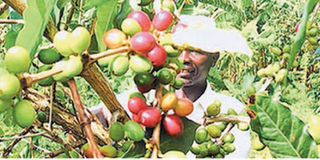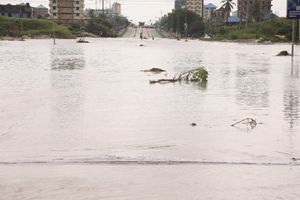Coffee exports down 23pc as drought ravages farms

Coffee. Tanzania’s coffee exports are expected to fall by 22.6 per cent in the 2016/17 season. PHOTO|FILE
What you need to know:
- That will happen as the export volume will decline.
- However, commodity prices have risen, Tanzania Coffee Board acting director general Primus Kimaryo told BusinessWeek on Friday.
Dar es Salaam. Tanzania’s coffee exports are expected to fall by 22.6 per cent in the 2016/17 season.
That will happen as the export volume will decline.
However, commodity prices have risen, Tanzania Coffee Board acting director general Primus Kimaryo told BusinessWeek on Friday.
“Coffee output has been declining due to a number of factors, the major ones include drought, low farm productivity and declining farm sizes due to urbanisation,” he said. “Coffee production fell from 60,188 tonnes in 2015 to 59,639 tonnes in June last year and the expectation is that in 2016/17 season it will further fall to 48,000 tonnes. Until now the country has exported 39,503 tonnes of coffee. We don’t expect much more exports in the forthcoming season, because it is a low season.” Tanzania got 136.6 million (Sh299.7 billion) last season from coffee exports, but this season $105.7 million (Sh230.4 billion) is expected to be earned.
“The world market auctioning prices for arabica coffee rose by 30 per cent,” said Mr Kimaryo.
While the prices of coffee auctioned locally had risen from Sh1000 to 1,000 per kg for Robusta and from 3,500 to over Sh4,000 a kg for Arabica, coffee output had not increased at the same trend, he said.
According to researchers, for a coffee grower to enjoy economic benefits of his/her work, at least 500 trees should be harvested every season. “But experience of Kilimanjaro Region shows that farm sizes have been declining every year as coffee farmers are afflicted by urbanisation and bad tradition of farm allocations to family members, who shift their economic activities from agriculture to trading,” said Mr Kimaryo. Coffee harvesting and marketing seasons normally start in June every year. The TCB is also responsible for monitoring the auctioning of coffee at the Moshi-based auction.
TCB’s 2016 report indicates growing demand for coffee in the world market driven by fall in output, but Tanzania is yet to exploit such an opportunity.
According to last November report of International Coffee Organisation, the world coffee exports amounted to 9.13 million bags in October 2016 compared with 9.31 million bags in October 2015.
“In the 12 months ending October 2016, exports of Arabica totalled 71.93 million bags compared to 69.21 million bags last year; whereas Robusta exports amounted to 40.46 million bags compared to 43.81 million bags,” reads the report.
Tanzania Coffee Research Institute (TaCRI) chief executive director James Teri speaks about challenges of distributing 19 hybrids to farmers at a time when wilt diseases is ravaging Robusta coffee. “The challenge we are facing now is the accelerated multiplication and distribution of these high yielding varieties of seedling to meet the high demand from growers.”
According to Prof Teri, when wilt disease invades a Robusta coffee farm it kills 100 per cent of trees. Tanzania Coffee Association chairman Amir Hamza laments that climate change has been reducing harvests while nuisance levies have frustrated farmers. Moreover, the lack of education on better farming practices has been detrimental. “That’s why coffee output and quality are low.”
Coffee is one of Tanzania’s major traditional exports.
It accounts for five per cent of total exports, 24 per cent of traditional cash crops and has been generating export earnings of an average of $100 million annually over the last 30 years, according to TCB.
More than 90 per cent of Tanzanian coffee comes from 400,000 smallholder farmers and benefits 2.5 million Tanzanians, says CBT.




